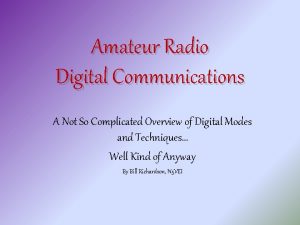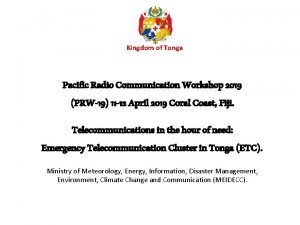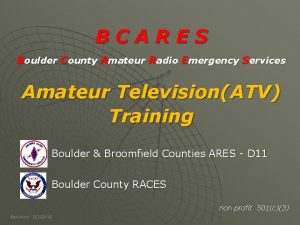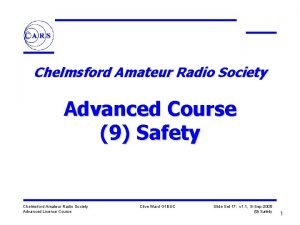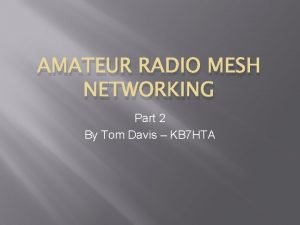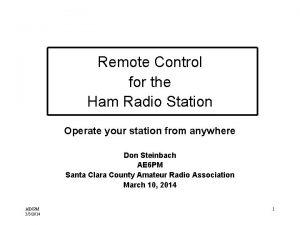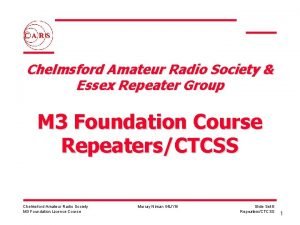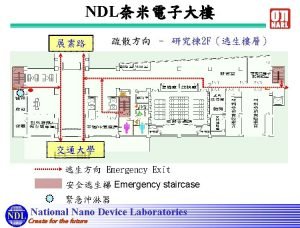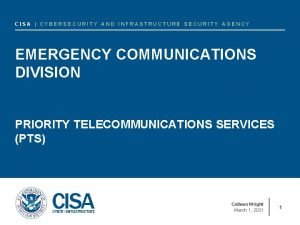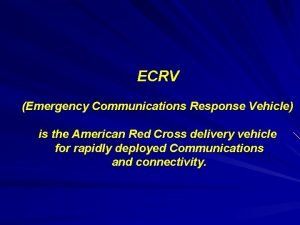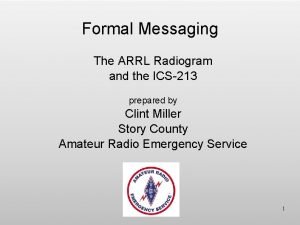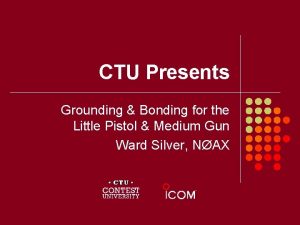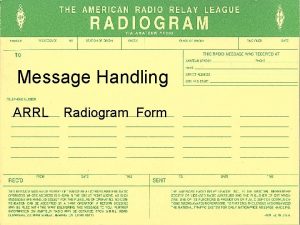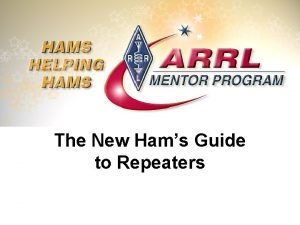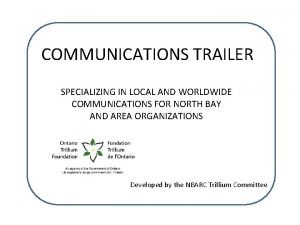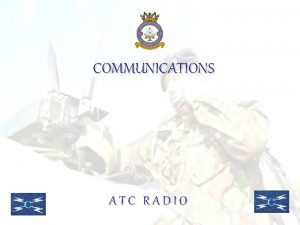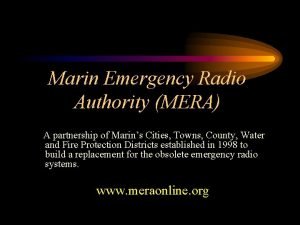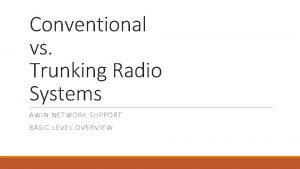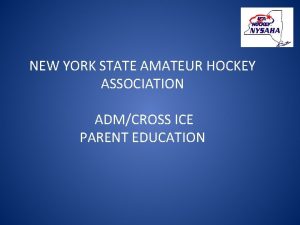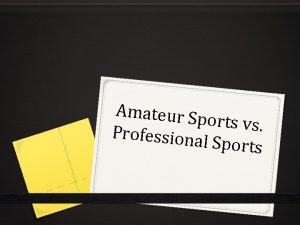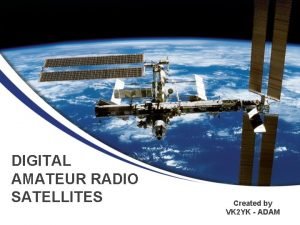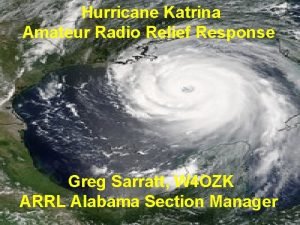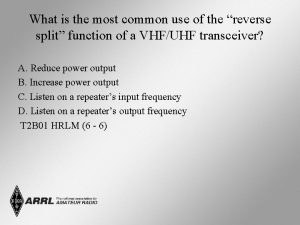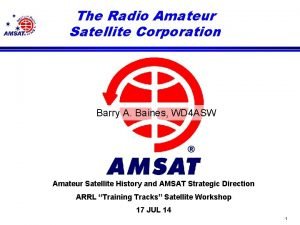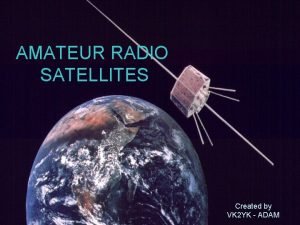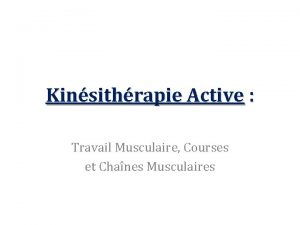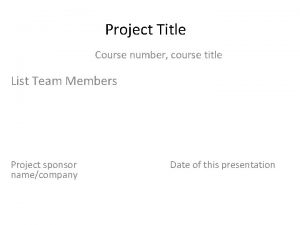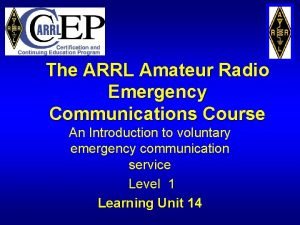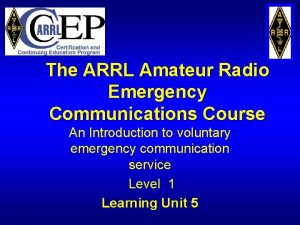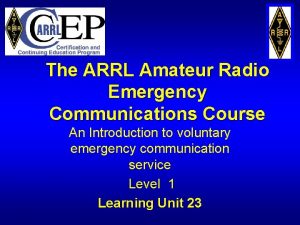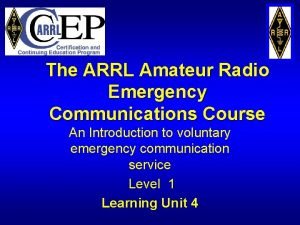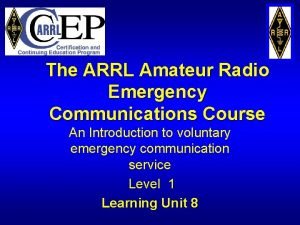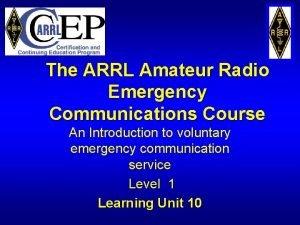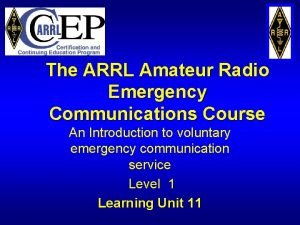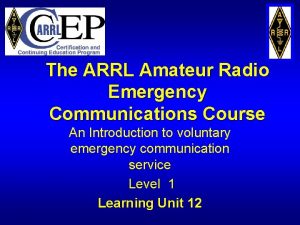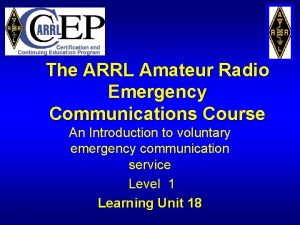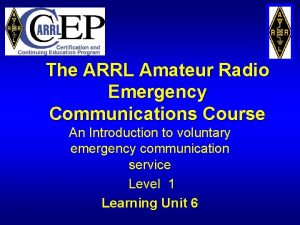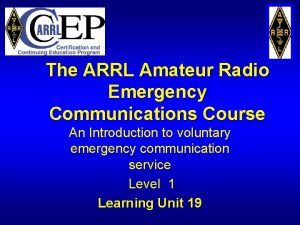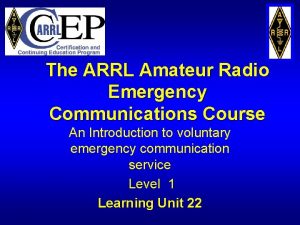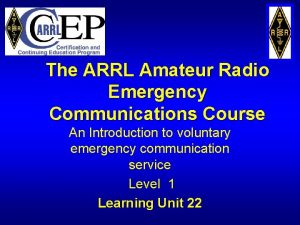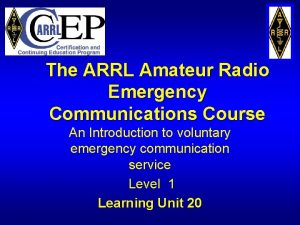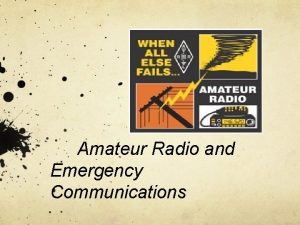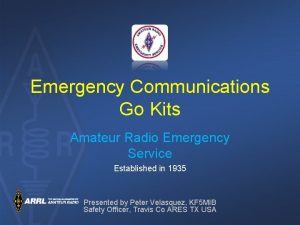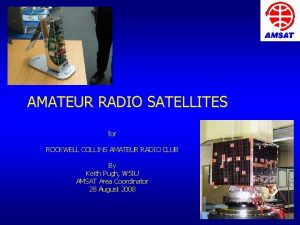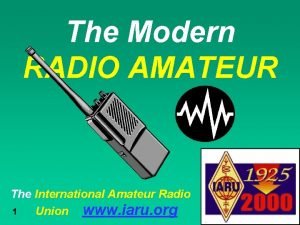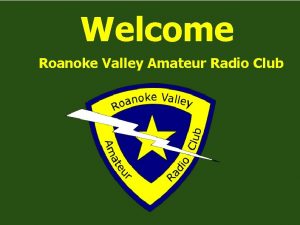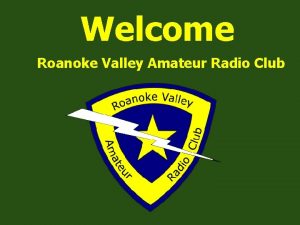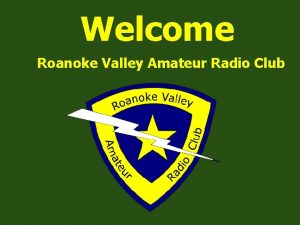The ARRL Amateur Radio Emergency Communications Course An











































- Slides: 43

The ARRL Amateur Radio Emergency Communications Course An Introduction to voluntary emergency communication service Level 1 Learning Unit 16

Operations & Logistics Learning Unit 16 Objectives: This unit will help you understand deal with some of the operating and logistical issues that arise during emergency relief and communication operations.

Operations & Logistics Learning Unit 16 Student preparation required: None

Choosing Phone Net Frequencies Unlike commercial and public safety radio users, Amateurs have a vast amount of radio spectrum to use in meeting the needs of an emergency. Most local and regional emcommunication takes place on 2 meter or 70 centimeter FM, or on 40, 60, or 80 meter SSB/CW. The choice made is based on the locations to be covered, the availability of repeaters, distance, terrain, and band conditions. VHF and UHF FM are preferred for most local operations because of the equipment is common, portable, has a clear voice quality and the coverage is extended by repeater stations. VHF and UHF communication range is determined by terrain, antenna height, and the availability of repeaters. For larger areas or in areas without repeaters, HF SSB may be needed. Most local emcomm operation is on the 40 or 80 -meter bands using Near Vertical Incidence Skywave (NVIS) propagation. For long-haul communication needs and international operations, 15 or 20 -meter nets may be the best option.

Choosing Phone Net Frequencies Many emcomm groups will have pre-selected a number of frequencies for specific purposes. The complete list of these frequencies should be in your jump kit, and pre-programmed into your radios.

Know Your Resources In Advance Become familiar with the coverage and features of each permanent repeater and digital message system in your area, and pre-program your radios with the frequencies, offsets, and CTCSS tones. Ask your EC or AEC which repeaters are used for emergency communication in your area. Will they be available for exclusive emcomm use, or must they be shared with other users?

Know Your Resources In Advance Information to find out include: • How does it identify itself? • Are there any "dead spots" in critical areas? How much power is required to reach the repeater with a clear, quiet, signal from key locations? • Does the repeater have a courtesy tone, and what does it sound like? Do the tones change depending on the repeater's mode? • How long is the "time-out timer"? • Is it part of a linked system of repeaters? What features does it have, and which touch-tone commands or CTCSS tones activate them?

Know Your Resources In Advance For net frequencies that support digital communication systems, such as packet radio bulletin board messaging systems, AMTOR, PSK 31 and RTTY: • • • over • Which software do they use? ARESPACK, Fnpack, FNpsk? Do the digital systems have mailboxes or digipeater functions? Which other nodes can they connect to? Can traffic be passed an Internet link automatically or manually? How many connections can they support at once?

Network Coverage Concerns Most emcomm managers rely on simplex operation when planning their VHF or UHF FM nets for one reason -- repeaters often do not survive disasters or are overwhelmed with the amount of traffic. Repeaters that do survive and are usable are considered a bonus. Since simplex range is limited by terrain, output power, antenna gain and height, operation over a wide area can be a challenge. Almost any structure or hill can block signals to some degree. To avoid last minute surprises, your group should pre-test all known fixed locations in your area for coverage. For instance, if you are serving the Red Cross, test simplex coverage from each official shelter to the Red Cross office and the city's EOC or other key locations, and mobile coverage in the same areas. If needed, there are several ways to improve simplex range: • Use an antenna with greater gain • Move the antenna away from obstructions • Use a directional antenna • Increase antenna height • Increase transmitter output power as a last resort.

Network Coverage Concerns In a fast moving situation with poor simplex coverage and no repeater, it can be helpful to place a mobile station on a hilltop or office building where they can communicate with, and relay for, any station in the net. A mobile relay station can also allow communications to follow a moving event, such a wildfire or flash flood. That station becomes, in effect, a "human repeater". Although an expedient "work-around", this is a slow and cumbersome process that can reduce net efficiency by more than half. A modern aid to this kind of operation is the "simplex repeater". This device automatically records a transmission, and immediately re-transmits it on the same frequency. Remember that FCC rules do not allow unattended operation of simplex repeaters, and that you must manually identify it. A better solution is a portable duplex repeater that can be quickly deployed at a high point in the desired coverage area. The coverage of this repeater does not have to be as good as a permanent repeater -- it just has to reach and hear the stations in your net. Portable repeaters have been used successfully from the back seat of a car, using a mobile antenna, and parked on a ridge or even the top floor of a parking garage. Portable masts and trailer-mounted towers have also been used successfully.

Network Coverage Concerns If all stations in the net have dual-band radios or scanners, a strategically located mobile radio may be operated in "cross-band repeater" mode. If you use your dual-band mobile in this manner for an extended period, use the low or medium power setting to avoid overheating and damaging your radio. Consider using a fan to further reduce the likelihood that your radio will be damaged from overheating. For a permanent repeater to be useful in a disaster, it must have emergency power, and be in a location and of such construction that it can survive the disaster. Agreements with repeater owners should be in place to allow emergency operations to the exclusion of regular users.

Frequency and Net Resource Management While we may have a large amount of frequency resources, in actual practice our choices are limited to the available operators and their equipment. Net managers may occasionally need to "shift" resources to meet changing needs. In the early stages of an emergency, the tactical nets may require more operators, but in later stages, the health and welfare traffic might increase. In addition to the main net frequency, each net should have several alternate frequencies available. These should include one or more "back up" frequencies for use in the event of interference, and one or two frequencies to be used to pass traffic "off net".

Message Relays When one station cannot hear another, a third station may have to "relay" the messages. Although this is a slow and cumbersome process, it is often the only way to reach certain stations. If relays must be used, move the stations involved off the main net frequency to avoid tying up the channel for an extended period.

Radio Room Security To protect your equipment and the messages you handle, and prevent unnecessary distractions, it is best to allow only the operators who are on duty to be in the room. Avoid leaving the radio room and equipment unattended and accessible. It is never a good idea to allow members of the press to be in the room without specific permission from the served agency.

Record Keeping Most served agencies will expect you to keep records of your operations. These records will certainly include original copies of any messages sent, station logs, memos, and official correspondence. Some may even require you to keep "scratch" notes and informal logs. Depending on agency policy, you may be required to keep these records in your own possession for a time, or to turn some or all records over to the agency at the end of operations. In some agencies, your station records are permanent and important legal documents, and must be treated as such. It is important to know your served agency's policy on record keeping in advance so that you can comply from the very beginning of operations.

Record Keeping Your station operating logs should probably contain the following information: • Your arrival and departure times • Times you check in and out of specific nets • Each message, by number, sender, addressee, and other handling stations • Critical events -- damage, power loss, injuries, earth tremors, other emergencies • Staff changes -- both emcomm and site management, if known • Equipment problems and issues Every individual message or note should be labeled with a time and date. In the case of scratch notes, place dates and times next to each note on a sheet, so that information can be use later to determine a course of events. If you expect to operate from the location for more than a day or two, establish a message filing system so that you can retrieve the messages as needed. A "portable office" type file box, expanding file, or any other suitable container can be used to organize and file the messages.

Record Keeping This is also an efficient way to allow another operator to pick up where you left off, even if they arrive after you leave. Effective record keeping allows them to come up to speed quickly.

Dealing With Stress and Egos Any unusual situation can create personal stress -- disasters create incredible amounts of it. Most people are not used to working under extreme stress for long periods, and do not know how to handle it. They can become disoriented, confused, unable to make good decisions or any decisions at all, lose their tempers, and behave in ways they never would any other time. Nervous breakdowns are common among those who get overwhelmed and have not learned to manage stress and stress-causing situations. Especially in the early hours of a disaster, the tendency is to regard every situation or need as an "emergency, " requiring an immediate response. You might get a barrage of requests for action. You might not have the extra seconds it requires to fully consider the options, and to prioritize your actions. The result is an overload of responsibility, which can lead to unmanageable levels of stress.

Dealing With Stress and Egos While you cannot eliminate disaster-related stress, you can certainly take steps to reduce or control it. Here are some tips to help you manage the situation to avoid creating, and deal with, excessive stress and stressful situations: • Delegate some of your responsibilities to others. Take on those tasks only you can handle. • Prioritize your actions --the most important and time-sensitive ones come first. • Do not take comments personally -- mentally translate "personal attacks" into "constructive criticism" and a signal that there may be an important need that is being overlooked. • Take a few deep breaths and relax. Do this often, especially if you feel stress increasing. Gather your thoughts, and move on. • Watch out for your own needs -- food, rest, water, medical attention.

Dealing With Stress and Egos • Do not insist on working more than your assigned shift if others can take over. Get rest when you can so that you will be ready to handle your job more effectively later on. • Take a moment to think before responding to a stress-causing challenge if needed, tell them you will be back to them in a few minutes. • If you are losing control of a situation, bring someone else in to assist or notify a superior. Do not let a problem get out of hand before asking for help. • Keep an eye on other team members, and help them reduce stress when possible. Some within the emergency response community have "big egos", and still others with a need to be in full control at all times. Both personality types can be problematic anytime, but far worse under stress. Take time now to consider how you will respond to the challenges they present. If your automatic response to certain behaviors is anger, make a conscious decision to come up with a different and more positive response strategy.

Dealing With Stress and Egos Depending on the official position of the "problem" person, you might: • Do your job as best you can, and deal with it after the emergency is over • Politely decline and state your reasons • Refer the issue to a superior • Choose in advance to volunteer in another capacity and avoid that person altogether

Long Term Operations As soon as it becomes clear that the situation is not going to return to normal for a while, you and your group should make plans for extended emcomm operations. Hopefully, your emcomm group and served agency have prepared contingency plans for this, and all you will have to do is put them into action. If not, here are some potential needs to consider: • Additional operators to allow for regular shift changes, and those who go home • Replacement equipment, as operators leave with their own gear or it fails • Food and water • A suitable place to sleep or rest • Generator fuel • Fresh batteries • Sanitation facilities

Long Term Operations • • Shelter Message handling supplies, forms Alternate NCS operators, backups Additional net resources to handle message traffic

Battery Management If you are operating on battery power, you will eventually need to recharge your batteries. As discussed earlier, some batteries need more time to recharge than others, and this time needs to be taken into account in your planning. Deep cycle marine batteries, for instance, can require a full day or longer to fully recharge. Sealed lead-acid (SLA) batteries, also known as "gel-cells", require up to 18 hours to recharge depending on the size of the battery. Ni. Cd, LIon, and similar batteries can be recharged quite quickly, although repeated rapid charge cycles can reduce overall battery life. If you are using slow-charging batteries, you may need to have enough on-hand to last the entire length of the operation. If your batteries can be charged quickly, some means must be provided for doing so. Some chargers can be powered from a vehicle's 12 -volt system, and are a good choice for emcomm. If no local means of charging is available, your logistics team may need to shuttle batteries back and forth between your position and a location with power and chargers.

Generator and Power Safety Take some care in the placement of generators so that they will not be a problem for others. Engine noise can make it difficult for shelter residents and volunteers to get much needed rest, and for anyone trying to do their job. Exhaust fumes should not be allowed to enter the building or nearby tents or vehicles. A position "down-wind" of any occupied location is best. Even when vehicles are not included, internal combustion engines are still the number one cause of carbon monoxide poisoning in the United States. Propane powered engines produce as much or more CO as gasoline or diesel engines. Earth grounding of portable or vehicle-mounted AC generators is not required as long as only plug and cord connected equipment is used, and the generator meets National Electrical Code (NEC) standards listed in Article 250 -6. The main exception is for generators that will be connected, even temporarily, to a building's permanent electrical system. For further details on grounding AC electrical systems, please refer to Article 250 of the NEC.

Ground Fault Interrupters (GFIs) add a further degree of safety when working with generators and portable power systems. GFIs detect any difference between the currents flowing on the hot and neutral conductors, and opens the circuit. Also, be sure to test any GFI device to be used with or near HF radios to be sure that the GFI will function properly while the radio is transmitting.

AC extension cords Extension cords used to connect to generators or other power sources should be rated for the actual load. Consider radios, lights, chargers, and other accessories when calculating the total load. Most extension cords are rated only for their actual length, and cannot be strung together to make a longer cord without "de-rating" the cord's capacity. For example, a typical 16 ga, 50' orange "hardware store" cord is rated for 10 amps. When two are used to run 100', the rating drops to only 7 amps. Choose a single length of cord rated for the load and the entire distance you must run it. If this is not possible, you can also run two or more parallel cords to the generator in order to reduce the load on any single cord. For more information on portable power cord requirements, consult Article 400 of the NEC. While some groups have used "Romex ™" type wire for long extension cords, this is actually a violation of the National Electrical Code, and a dangerous practice. Repeated bending, rolling, and abrasion cause the solid copper conductors and insulation to break, resulting in a fire and electrocution hazard. Use only flexible insulated extension cords that are UL rated for temporary, portable use.

Equipment -- Leaving Yours Behind? You are exhausted, and ready to head for home, but the emcomm operation is far from over. You brought along a complete station, and when you leave, the next operator is not nearly as well equipped. Should you leave your equipment behind for the next operator? You have several options here -- and they are all yours to choose from. No one can, or should, tell you to leave your equipment behind. If you feel comfortable that someone you know and trust will look after your gear, you may choose to leave some or all of it behind. If you do, be sure every piece is marked with at least your name and call sign. Do not leave behind anything the next operator does not truly need. Also, remember that even if you leave the equipment in the possession of someone you know, you still have the ultimate responsibility for its operation and safety. Emergency stations are difficult places to control and monitor. If your equipment is stolen, lost, or damaged, you should not hold anyone responsible but yourself. Conversely, if someone leaves their equipment in your care, treat and protect it better than you would your own, and be sure it is returned safely to its owner.

Accepting Specialized Assignments In the world of modern emcomm, you may be asked to handle other assignments for the served agency that may or may not include communicating. At one time, most emcomm groups had strict policies against doing other tasks, and this is still true of some. In the days when radios were difficult to operate under field conditions and required constant attention, this was important. The other common reason given is that you have volunteered to be a communicator, not a "bed pan changer". It is true that some agency's staff will abuse the situation when they are short of help, but if both the agency's staff and emcomm group are clear about any limits beforehand, the problem should not arise. Today, most emcomm groups will permit their members to be crosstrained for, and perform, a variety of served-agency skills that also include communicating. Examples are SKYWARN weather spotting, Red Cross damage assessment, and many logistics jobs.

Accepting Specialized Assignments If your group still has a "communication only" policy, are you really meeting your agency's needs? Is it necessary to have a damage assessment person AND a communicator to do that job? What would happen to your agency if each driver also had to bring along a dedicated radio operator? Can one person do both jobs?

Review Simplex operation is often preferred over repeaters because repeaters may fail in a disaster situation. Frequencies and operators are a resource that should be managed for maximum efficiency and effectiveness. Record keeping is essential to an effective emcomm operation. It allows messages to be tracked, and preserves continuity when personnel change. Demanding situations like disasters can breed disagreements, especially when strong egos and short-fused tempers are introduced. Take steps to reduce the level of stress on yourself, and do not respond in kind to an angry person. When an operation looks like it will be an extended one, begin immediately to prepare for the additional people and resources necessary to sustain the operation. Arrange to charge batteries as needed. Use generators and power distribution equipment safely. Leaving your equipment behind is a choice only you can make. Think about this well in advance to be sure other arrangements are made before you leave with all your equipment. Modern emcomm groups often accept other agency tasks beyond just communications.

Student Activity (choose two) 1. Develop a set of "rules" to help a new emcomm group member deal with stress during an emergency. 2. Develop a list of at least five possible served agency jobs that would also require your communication skills. 3. Develop five safety rules pertaining to generators and electrical lines in and near a radio room.

Question 1 Which of the following will NOT limit VHF simplex range? A. B. C. D. Terrain. Output Power. Antenna Gain. Digipeaters.

Answer 1 Which of the following will NOT limit VHF simplex range? D. Digipeaters.

Question 2 Which of the following actions will NOT improve simplex reception? A. B. C. D. Increase the antenna height. Switch to a lower-gain, non-directional antenna. Increase transmitter output power at both stations. Move the antenna away from obstructions.

Answer 2 Which of the following actions will NOT improve simplex reception? B. Switch to a lower-gain, non-directional antenna.

Question 3 Which of the following is true about a simplex repeater? A. B. C. D. The FCC rules do not permit unattended operation of simplex repeaters. They work best in the "cross band repeater" mode. They require the use of two radios. Is the same as a "human repeater. "

Answer 3 Which of the following is true about a simplex repeater? A. The FCC rules do not permit unattended operation of simplex repeaters.

Question 4 Which of the following is NOT an appropriate served agency assignment for an emcomm volunteer? A. B. C. D. Field damage assessment and reporting. Driving a supply delivery vehicle. Typing inventory lists and filing memos. Gathering weather data and reporting conditions.

Answer 4 Which of the following is NOT an appropriate served agency assignment for an emcomm volunteer? C. Typing inventory lists and filing memos.

Question 5 Which of the following is a good means of dealing with stress during an emcomm event? A. B. C. D. Take every comment personally. Pay no attention to other team members; let them handle their own problems. To reduce personal stress, insist on working more than your own shift. Prioritize your actions - the most important and time sensitive ones come first.

Answer 5 Which of the following is a good means of dealing with stress during an emcomm event? D. Prioritize your actions - the most important and time sensitive ones come first.

 Amateur radio digital communications
Amateur radio digital communications Tonga amateur radio
Tonga amateur radio Chelmsford amateur radio society
Chelmsford amateur radio society Bcares
Bcares Chelmsford amateur radio society
Chelmsford amateur radio society Ubiquiti link calculator download
Ubiquiti link calculator download Amateur radio mesh network
Amateur radio mesh network Ham radio deluxe remote control
Ham radio deluxe remote control Chelmsford amateur radio society
Chelmsford amateur radio society National emergency communications plan
National emergency communications plan Cisa ecd
Cisa ecd Emergency communications response vehicle
Emergency communications response vehicle Arrl radiogram
Arrl radiogram Arrl grounding and bonding pdf
Arrl grounding and bonding pdf Arrl field day rules
Arrl field day rules Arrl logbook
Arrl logbook Arrl radiogram
Arrl radiogram Travelplus for repeaters
Travelplus for repeaters Arrl logbook
Arrl logbook Ham radio communications trailers
Ham radio communications trailers Atc communications and radio procedures
Atc communications and radio procedures Marin emergency radio authority
Marin emergency radio authority Trunking vs conventional radio system
Trunking vs conventional radio system New york state amateur hockey association
New york state amateur hockey association Amateur lust
Amateur lust Amateur teacher student
Amateur teacher student Amateur sp
Amateur sp Vk amateur
Vk amateur Katrina amateur
Katrina amateur Insemination amateur
Insemination amateur Where may ssb phone be used in amateur bands above 50 mhz?
Where may ssb phone be used in amateur bands above 50 mhz? Amateur sdx
Amateur sdx Vk com amateur
Vk com amateur Telescopio amateur
Telescopio amateur Random amateur
Random amateur Hot japanese amateur
Hot japanese amateur Amateur revenge porn
Amateur revenge porn Course interne moyenne externe
Course interne moyenne externe T junction flemish bond
T junction flemish bond Course title and course number
Course title and course number Cái miệng nó xinh thế
Cái miệng nó xinh thế đặc điểm cơ thể của người tối cổ
đặc điểm cơ thể của người tối cổ Cách giải mật thư tọa độ
Cách giải mật thư tọa độ Tư thế worm breton
Tư thế worm breton
